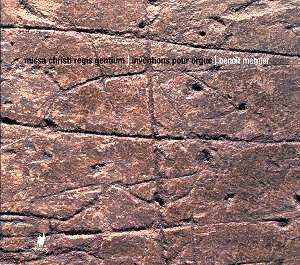Benoît Mernierís Missa Christi Regis Gentium,
completed in 2000, was commissioned to celebrate the 30th
anniversary of the Messe des Artistes, an annual event held in
Brussels Cathedral. The project also allowed the composer to exploit
the full range of the recently inaugurated new organ built by Gerhard
Grenzing. (Benoît Mernier is also an excellent organist - heard
here as the performer of his Five Inventions.)
The Mass, an ambitious large-scale work, sets the ordinary
mass without the Credo. The Kyrie is built as a big crescendo-decrescendo
discreetly accompanied by the organ. The middle section Christe Eleison,
and the climax of the movement, is rhythmically more complex and seems
to use some controlled aleatoric techniques to telling effect. The much
longer Gloria is more varied with several organ soli interspersed
all through the rendering of the text, and alternates jubilant and meditative
episodes, while the writing for voices is more varied and rather complex
from the rhythmical viewpoint. The Sanctus calls for a double
chorus and both choral groups either echo each other or join forces.
Again rhythmically complex since the choirs and the organ often play
at different tempi. The Benedictus is sung by eight female voices
that sing some sort of Klangfarben melody imparting this beautiful
section with a fascinating angelic tone. In the Sanctus-Benedictus,
the organ is confined to a rather discreet accompanying role. In the
final Agnus Dei, however, the organ has the leading role and
the whole section is more like a big organ solo, this time interspersed
with choral episodes. The Agnus Dei, and the whole Mass, ends
as it began: in utter serenity. The Mass is a beautiful, superbly crafted,
sometimes intricate but always accessible work of considerable substance.
It definitely deserves wider exposure, and I hope that this excellent
performance will prompt crack choirs to investigate this magnificent
piece.
As already mentioned, Benoît Mernier is a brilliant
organist who already has several recordings to his credit. However,
Five Inventions, written over the period 2000-2001, is
his first major work for his instrument. (The First Invention was played
during the first performance of the Mass, and this is Ė I think Ė the
first complete performance of the whole set.) As might be expected,
Mernier sets out to explore the organís range in five pieces of markedly
different character, whether linear or contrapuntal, straightforward
or more complex and demanding. The Fifth Invention, drawing on elements
from the preceding ones, is a powerful, grand synthesis of the whole
set. A major organ work, and hopefully the first in a long series to
come.
I
recently reviewed a first CD (CYPRÈS CYP 4613) devoted to
Mernierís orchestral and instrumental music. The present release is
also most welcome as it offers two substantial works signposting Mernierís
musical progress over the last few years. They amply confirm that he
is one of the most endearing composers of his generation.
Hubert Culot


